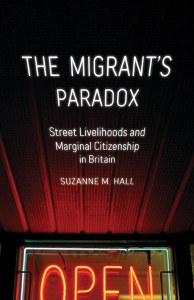The Architectural Review: Migration at the Margins
 The Migrant’s Paradox insists on a recognition of the overlapping forces of racial capitalism which produce certain streets as marginal and edge conditions, and construct parts of the world as uninhabitable. Edge conditions require a constant negotiation of borders: of multiple national borders, legal boundaries and linguistic barriers among others.
The Migrant’s Paradox insists on a recognition of the overlapping forces of racial capitalism which produce certain streets as marginal and edge conditions, and construct parts of the world as uninhabitable. Edge conditions require a constant negotiation of borders: of multiple national borders, legal boundaries and linguistic barriers among others.
Hall asks us to look "both from the outside in and the inside out," to look again and pay attention to the often ordinary and banal spaces that make up cities. In reading and writing these streets – and the spaces connected to them – Hall draws out the complex layers of dispossession and wide geographies of entanglement that mark and define these edge territories.
Read the full essay at The Architectural Review.



